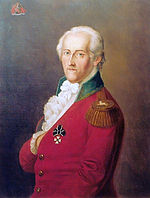Adolph Freiherr Knigge, Date of Birth, Place of Birth, Date of Death
TweetAdolph Freiherr Knigge
German writer and FreemasonAbout Adolph Freiherr Knigge
- Freiherr Adolph Franz Friedrich Ludwig Knigge (16 October 1752 – 6 May 1796) was a German writer, Freemason, and a leading member of the Order of the Illuminati. Knigge was born in Bredenbeck (now a part of Wennigsen, Lower Saxony) in the Electorate of Hanover as a member of the lesser nobility.
- When he was barely eleven, his mother died, and when his father died three years later the teenager inherited a large debt.
- His creditors took possession of the family property and assigned the boy a meagre pension of 500 thalers.He studied law from 1769 to 1772 in Göttingen where he became a member of Corps Hannovera.
- He was allegedly initiated into Freemasonry in 1772 in Kassel, where he held a position as Court Squire (hofjunker) and Assessor of the War and Domains Exchequer.
- In 1777 he became Chamberlain at the Weimar court. In 1780 Knigge joined Adam Weishaupt's Bavarian Illuminati and his work with the Illuminati gave the group a great deal of publicity.
- But in 1783 dissensions arose between Knigge and Weishaupt, which resulted in Knigge's final withdrawal from the group on 1 July 1784.
- Knigge stated that he could no longer endure Weishaupt's pedantic domineering, which frequently assumed offensive forms.
- He accused Weishaupt of "Jesuitism", and suspected him of being "a Jesuit in disguise" (Nachtr., I, 129).
- "And was I", he adds, "to labour under his banner for mankind, to lead men under the yoke of so stiff-necked a fellow?—Never!" Knigge's involvement with the Illuminati, support of the advancement of human rights, and a period of serious illness led to the loss of support of his aristocratic sponsors and finally his fortune.
- Knigge found a measure of financial stability again with a position in Bremen in 1790.
- He died in Bremen in 1796. In Germany, Knigge is best remembered for his book Über den Umgang mit Menschen (On Human Relations), a treatise on the fundamental principles of human relations that has the reputation of being the authoritative guide to behaviour, politeness, and etiquette.
- The work is more of a sociological and philosophical treatise on the basis of human relations than a how-to guide on etiquette, but the German word “Knigge” has come to mean “good manners” or books on etiquette.
Read more at Wikipedia
See Also
- Famous People's Birthdays on 16 October, Germany
- Famous People's Birthdays in October, Germany
- Famous writer's Birthdays on 16 October, Germany
- Famous writer's Birthdays in October, Germany
- Famous composer's Birthdays on 16 October, Germany
- Famous composer's Birthdays in October, Germany
- Famous biographer's Birthdays on 16 October, Germany
- Famous biographer's Birthdays in October, Germany
- Famous philosopher's Birthdays on 16 October, Germany
- Famous philosopher's Birthdays in October, Germany


 Date of Birth:
Date of Birth:  Place of Birth: Bredenbeck, Lower Saxony, Germany
Place of Birth: Bredenbeck, Lower Saxony, Germany